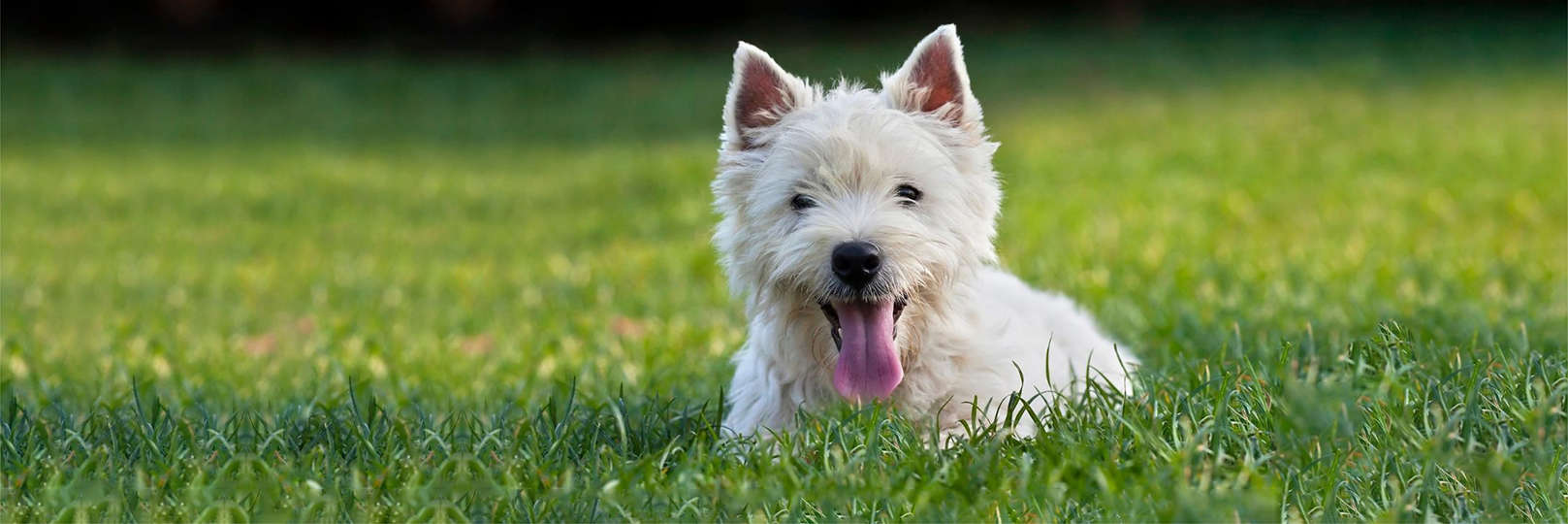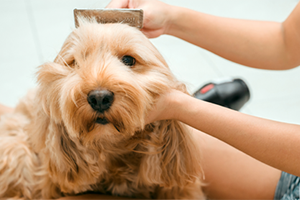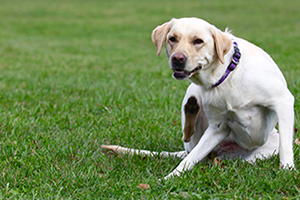
An inquisitive, cheerful playmate for the whole family
Vital stats
Swipe to view more
| Size: | Small |
| Coat: | Double coat, groom weekly |
| Exercise | 60 - 90 minutes every day |
| Life span: | 10+ years |
| Breed group: | Terrier |
| Temperament: | Friendly, alert, confident |
West Highland White Terrier temperament & personality

Always on the lookout for something fun to do, this busy little dog is guaranteed to make you smile.
- Bred to burrow for rats and rodents, Westies are a bold and headstrong breed with a strong working instinct.
- Westies’ independent nature means they’re happy to be left to their own devices, provided there’s adequate toys available.
- However, they are friendly and extremely sociable which has led them to become popular companion dogs and family pets.
- Terriers have a reputation for being vocal and the Westie is no exception. Socialisation will help to keep the barking to a minimum but this is a breed who like to bark.
West Highland White Terrier training & exercise

Training tips
- This intelligent breed is a quick learner and loves training, as long as they know what’s in it for them!
- Clicker training tends to be very effective for Westies
- Westies have a lot of self-esteem and respond best to positive training methods.
- This breed can get bored easily so keep training sessions short.
Exercise
- West Highland White Terriers’ small size means that they don’t need as much exercise as larger breeds, but a daily walk, of around 60 to 90 minutes, is still needed.
- Some Westies love to swim but extra care should be taken around water because this breed is not as at home in the water as others.
Keeping them happy
- Westies are happy to be left alone, as long as they have plenty of toys and games they can entertain themselves with.
- As a natural born digger, many Westies will try and dig for freedom if your garden is not secure.
- At play time, try a treasure hunt. Bury your Westie’s favourite toy or treat in some sand and let them dig it up.
Common West Highland White Terrier health conditions

West Highland White Terrier grooming

Grooming is an easy business where the Westie is concerned, with minimal brushing and bathing required.
- Westies should be brushed once a week to remove any matting and tangles.
- Considered a low shedding breed, Westies may be more suitable for those with allergies.
West Highland White Terrier nutrition

Westies have particularly sensitive stomachs and can be prone to food allergies and diabetes so the right diet is crucial. If you have concerns about your dog’s specific dietary requirements, you vet will be able to help you choose the right food.
- Many Westies do best on a hypoallergenic diet that is grain-free and contains natural meat proteins.
- Smaller meals help with digestion, so feed twice a day
- As Westies can also suffer from skin conditions you can add fatty acid supplements to their meals; always check this with your vet first, though.
What to know before you buy or rehome a West Highland White Terrier

Considering welcoming a lovable Westie into your home? Before you buy or adopt one, here are a few important things to remember.
- Westies tend to get on well with children, other dogs and even cats but they’re instinct to chase smaller animals is hardwired.
- Westies are more independent than most breeds and will happily be left to their own devices.
- As a terrier, the Westie can be a little more vocal than other breeds; something to consider, especially for those living in apartments
- Choose a licensed and reputable West Highland White Terrier breeder if you’re buying a puppy. ‘Lucy’s Law’ dictates that new puppies or kittens must be bought directly from a breeder or adopted from rescue. Third party sellers are illegal.
- Like all dogs, West Highland White Terriers can suffer from a range of health conditions so always look carefully at the veterinary cover provided when shopping around for pet insurance as not all policies are the same.
West Highland White Terriers frequently asked questions
Discover some of the most popular dog breeds
West Highland White Terrier insurance considerations
We always offer these things as standard:
Physiotherapy & pet therapies
Along with physiotherapy, which is covered within the Vet Bills benefit, we also cover Pet Therapies like herbal medicine, homeopathy and acupuncture. You can also claim for hydrotherapy, up to £500 per illness/injury in dogs and cats (no additional limit for rabbits).
Petplan is a trading name of Pet Plan Limited (Registered in England No. 1282939) and Allianz Insurance plc (Registered in England No. 84638), Registered office: 57 Ladymead, Guildford, Surrey GU1 1DB.
Pet Plan Limited is authorised and regulated by the Financial Conduct Authority. Financial Services Register No. 311969. Allianz Insurance plc is authorised by the Prudential Regulation Authority and regulated by the Financial Conduct Authority and the Prudential Regulation Authority. Financial Services Register No. 121849. Pet Plan Limited is a subsidiary of Allianz Insurance plc.














































